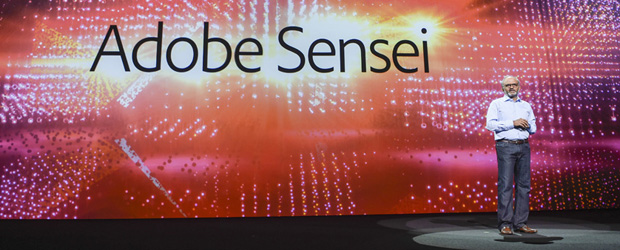LAS VEGAS – Sensei, Adobe Systems Inc.’s machine learning and artificial intelligence platform, is already approaching its six-month anniversary, but if you can’t identify what, exactly, it adds to the company’s recently-released Experience Cloud, you aren’t alone.
During a March 21 executive session at Adobe Summit, R. “Ray” Wang, founder and principal analyst with Silicon Valley-based Constellation Research, asked Adobe CEO Shantanu Narayen how far along Sensei was in its development and what, precisely, its function was, and came away disappointed by the answer.
“Is it APIs? Is it product ties? Is it services?” Wang asked. “Where are you on that?”
“I think we’ve been doing magic for decades,” Narayen began. “What I think we’ve done a really good job of is taking the frameworks and concepts of how we think all of the magic that we’ve done can be applied in APIs, applied as features, applied to each of our different clouds, and productized it so that not only we can use it, but our customers can also use it.”
Narayen then invited his colleagues, CTO Abhay Parasnis and executive vice president Brad Rencher, to expand on his answer.
Parasnis emphasized that many of Adobe’s existing solutions, including the newly-reminted Analytics Cloud, had been incorporating machine-learning and statistical modeling already.
“What we are now doing with Sensei is taking the best learnings from our Creative Cloud, Experience Cloud, and Document Cloud, and distilling the magic that we’ve enabled for end-users into a platform that we can not only use for our own solutions, but open up for the broad ecosystem,” Parasnis said.
Rencher, meanwhile, noted that many of the numerous product demonstrations that Summit attendees witnessed during the two-day conference incorporated Sensei-powered innovations and features.
“We’re early innings, but it’s already manifesting itself for customer value,” he said.
When asked later by CDN if he was satisfied with the executives’ answer, Wang’s response was succinct: “Hah. Not really.”
“What we know is that they have a lot of algorithms, analytics, and statistical models,” he said, noting that in its present form Sensei more closely resembles IBM Watson than one of Adobe’s cloud platforms, with certain products, APIs, and a great deal of services required to make it work.
“Over time, we do expect them to leverage their large datasets to be able to find the patterns and apply the machine learning so that they can then offer an array of micro services and APIs that customers can pay for and consume,” Wang said. “I think they’ve articulated a good vision but there still is a lot to build to get it to production.”



